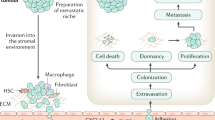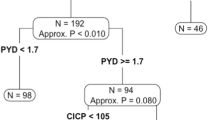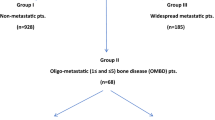Abstract
Assessment of response of skeletal metastases to systemic therapy is currently dependent on radiological evidence of bone healing. We have performed a prospective study of additional response criteria in patients with progressive bone metastases from breast cancer. Changes in these potential markers of response were correlated with the radiological response and the time to treatment failure (TTF). Successful systemic therapy typically led to a transient increase in osteoblast activity ('flare'), a reduction in osteoclast activity and symptomatic improvement. After 1 month a greater than 10% rise in serum osteocalcin (BGP) and alkaline phosphatase bone isoenzyme (ALP-BI) and a greater than 10% fall in urinary calcium excretion were seen in 14/16 patients with radiographic evidence of bone healing (UICC partial responders). In comparison similar biochemical changes at 1 month were seen in only 4/20 patients with progressive disease (P less than 0.001). The predictive value and diagnostic efficiency (DE) of changes at 1 month in biochemical measurements and symptom score has been calculated. The combination of a greater than 10% rise in ALPBI and BGP and a greater than 10% fall in urinary calcium excretion had a DE of 89% for discriminating response from progression, 88% for response from non-response (progressing + no change patients), and 76% for TTF of greater than 6 months from TTF of less than 6 months. Serum calcium, tartrate resistant acid phosphatase (TRP), urinary hydroxyproline excretion and bone scan changes were unhelpful in discriminating between patient groups. Independent confirmation is needed, but our results suggest there are reliable alternatives to plain radiography in the early assessment of response of bone metastases to treatment.
This is a preview of subscription content, access via your institution
Access options
Subscribe to this journal
Receive 24 print issues and online access
$259.00 per year
only $10.79 per issue
Buy this article
- Purchase on Springer Link
- Instant access to full article PDF
Prices may be subject to local taxes which are calculated during checkout
Similar content being viewed by others
Author information
Authors and Affiliations
Rights and permissions
About this article
Cite this article
Coleman, R., Whitaker, K., Moss, D. et al. Biochemical prediction of response of bone metastases to treatment. Br J Cancer 58, 205–210 (1988). https://doi.org/10.1038/bjc.1988.194
Issue Date:
DOI: https://doi.org/10.1038/bjc.1988.194
This article is cited by
-
PET-based estradiol challenge as a predictive biomarker of response to endocrine therapy in women with estrogen-receptor-positive breast cancer
Breast Cancer Research and Treatment (2009)
-
Measurement of urinary collagen cross-links indicate response to therapy in patients with breast cancer and bone metastases
British Journal of Cancer (1999)
-
Assessment of bone response to systemic therapy in an EORTC trial: preliminary experience with the use of collagen cross-link excretion
British Journal of Cancer (1999)
-
Hypercalcemia in breast cancer
Clinical & Experimental Metastasis (1993)
-
Medical treatment of tumor-induced hypercalcemia and tumor-induced osteolysis: challenges for future research
Supportive Care in Cancer (1993)



